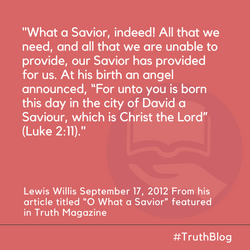"O What a Savior"
Posted by Lewis Willis on Jul. 6, 2022
Marvin P. Dalton wrote a song in 1948 which conveys a powerful and beautiful message. Very seldom do we sing the song, but I would like to focus your attention on its words.
Once I was straying in sin’s dark valley,
No hope within could I see;
They searched through heaven and found a Savior
To save a poor lost soul like me.
He left the Father, with all His riches,
With calmness sweet and serene,
Came down from heaven and gave his lifeblood
To make the vilest sinner clean.
Death’s chilly waters I’ll soon be crossing,
His hand will lead me safe o’er;
I’ll join the chorus in that great city,
And sing up there forevermore.
(chorus)
O what a Savior, O hallelujah,
His heart was broken on Calvary;
His hands were nailscarred, His side was riven,
He gave His lifeblood for even me.
What a Savior, indeed! All that we need, and all that we are unable to provide, our Savior has provided for us.
The Greek word, soter, is translated “savior” and means deliverer, preserver (Vine 322). In classical Greek the term was applied to mighty men or rulers. In the Bible, however, it is applied to either God the Father or to Jesus Christ.
In the O.T. only God was Savior. “I, even I, am the Lord; and beside me there is no saviour” (Isa. 43:11, cf. 45:21; Hos. 13:4). Israel under- stood that their deliverance could only come through God. As a matter of fact, their greatest problem manifested itself when they sought to save themselves, or when they relied upon someone other than God for their preservation. Also, in the O.T., the term is not so much a title as it is a description of God’s action in behalf of his people.
In the N.T. the term is never applied to a mere man. While sometimes God the Father is identified as Savior (Luke 1:47; 1 Tim. 1:1), the term most commonly refers to Jesus Christ as Savior.
At his birth an angel announced, “For unto you is born this day in the city of David a Saviour, which is Christ the Lord” (Luke 2:11). Though Matthew does not use the term “Savior” in his account of the birth of Christ, he has the angel say, “And she shall bring forth a son, and thou shalt call his name Jesus: for he shall save his people from their sins” (Matt. 1:21). Jesus himself understood his mission as Savior, saying, “For the Son of man is come to seek and to save that which was lost” (Luke 19:10).
No man can save himself. We are dependent upon deity for our salvation. In the Pauline epistles the deity of Christ is referred to in connection with his role as Savior. Note these passages in Paul’s letter to Titus: “Not purloining, but showing all good fidelity; that they may adorn the doctrine of God (deity) our Saviour in all things . . . Looking for that blessed hope, and the glorious appearing of the great God (deity) and our Saviour Jesus Christ” (Tit. 2:10, 13). These are references to the deity of Jesus, and they clearly teach that our salvation and deliverance must come from God.
Early in his ministry the role of Jesus as Savior was understood by those whom he encountered. At Jacob’s well, He met the woman of Samaria and taught her of the blessings he sought to give. She went to the people of her city and told them of her conversation with Christ, whereupon many of them went forth to talk with him themselves. The N.T. says “many more believed” when they heard the words of Jesus. Now notice, they said to the woman, “. . . for we have heard him ourselves, and know that this is indeed the Christ, the Savior of the world” (John 4:42).
The term “savior” presupposes a danger or disaster from which the deliverer snatches the one whom he helps. That danger is clearly identified in the Scripture. We need deliverance from the worst affliction and trouble known to mankind — deliverance from sin. When John writes “. . . that the Father sent the Son to be the Savior of the world” (1 John 4:14), he was referring to the world’s problem of sin. Jesus came to deliver (save) us from sin (Matt. 1:21).
However, the cost of salvation would be great! The Savior would go to Calvary, and shed his own blood, to save us. There could be no greater expression of love and grace than that shown when the Father sent his Son to die in our stead (Isa. 53; Rom. 5:8-9), that we might be delivered from the curse of sin. Sin entered the world in the Garden of Eden, and men throughout all ages have continued to practice sin. The apostle Paul declared that “all have sinned” (Rom. 3:23). The Savior could give nothing greater than himself, so he sacrificed himself that we might be saved.
Today the church proclaims the gospel of salvation to men of this world who are lost and dying in sin. Jesus commissioned the church to do so (Mark 16:15; Rom. 1:16). He authored salvation to all of us who will obey him (Heb. 5:9). We are seeking to be faithful to our charge, and call sinners to come to the Savior. What a wonderful Savior he is! If you are lost, we are directing you to the only Savior you will ever have — our Lord and Savior Jesus Christ. Do you realize your need to be delivered from the sin which condemns you before God? If so, we plead with you, obey the Savior and be saved! Your salvation will not occur until you make up your mind to obey Christ.
From the September 12, 2012 publication of Truth Magazine.
…
 Back to Main Menu
Back to Main Menu
